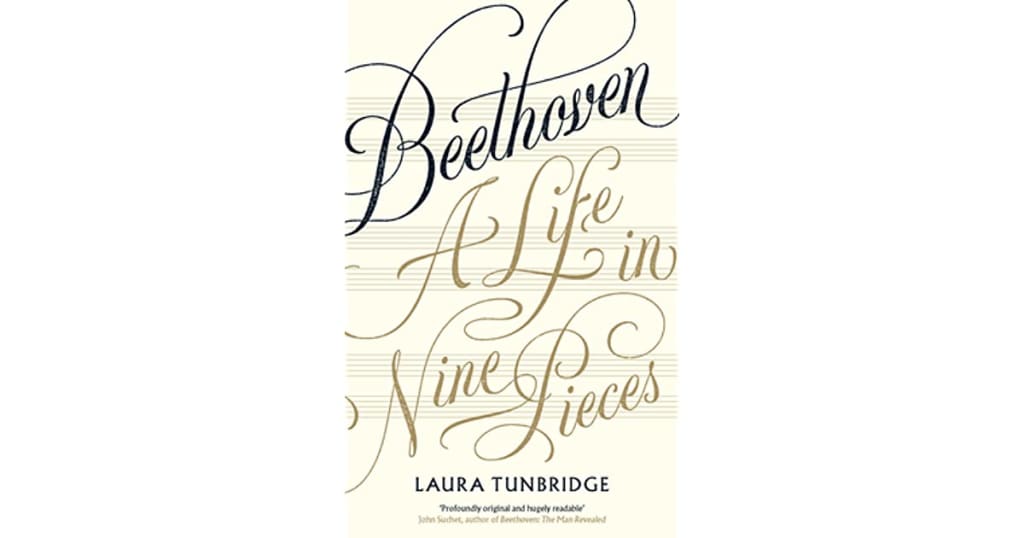Book Review: “Beethoven: A Life in Nine Pieces” by Laura Tunbridge
5/5 - A modern masterpiece and a cultural phenomenon of biographical writing

Many may just call this a great biography about Beethoven, but that really isn’t it at all. This book is more like a celebration of his life whilst also filling in the gaps that had previously been marred by popular culture. The latter presents us with a scowling image of a man toiling over a masterpiece in a famous piece of artwork, but Tunbridge argues that this isn’t actually it at all. Beethoven was far more than just a discontent who worked day and night on his music - he was a three dimensional personality and a man who was way ahead of his time whilst also being a product of it. Tunbridge seeks to let us explore into the world of Beethoven and how he really went about his pieces and his masterpieces in the contexts of the social, cultural and political realms. It is a wonderful book that I’m sure that Beethoven himself would be very proud to have written about him.
The book starts off by giving light to Beethoven’s financial situation. This seems to me to be a very important aspect of his composition because obviously, without it, he would struggle to make a living and therefore, he would not really be the person we know today. The financial situation is also very important because it makes light of the fact that, even in Beethoven’s own time, he was different and standing out. His experimental methods, as it is put in the text, were only helped along by the constant refurbishment of funds and therefore, he was never unpaid due to a composition the patron did not like.
Throughout the text we are engaged fully and immersed within this classical Viennese style and from it, we get various political situations concerning the Holy Roman Empire, Prussia and Bohemia - we also get the great Goethe stepping in to give us some of his philosophies. But most of all, we get this all applied to how this impacted the composition style of Beethoven. From what we believe commonly as just increasing amounts of musical genius was actually the stylings of Beethoven working to be better than his own time and place whilst also incorporating trends of people like Haydn and Mozart - the equally popular composers of the time. It helps us ultimately, to put Beethoven into a context.
I have to say when I got to the part about the end section of the composition “Ode to Joy”, I was enthralled. Tunbridge’s writing is passionate, descriptive and leaves you wanting to really listen to the piece and look for that key moment of ending and new beginning. The writing is even more beautiful if you listen to the piece whilst reading the passage. Tunbridge’s passion and knowledge really shine through in that section, making it the section I possibly most enjoyed and most returned to.
Beethoven’s musical compositions are also explained as being influences from historical and cultural, social and political movements of his own time and thus, we get names such as Jean Jacques Rousseau, Schiller, Haydn, Goethe and many more crop up - from France we get the monarchy in which Beethoven is explained as being pretty immersed in the revolutionary culture over there. The French Revolutionary spirit is referenced by Tunbridge as having a profound impact on his character and no doubt, on his music as well.
The other thing I thought was amazing about Tunbridge’s work was the fact that the book, though it was about a man and a subject that are both incredibly difficult to make sense of, was amazingly simple to read. It contained no real esoteric language and even if there were harder or more technical words, they were referenced in an easy glossary. This book really does capture the imagination of the wider audience and wants to really change how you think of Beethoven not as a composer, but as a person. It does this through projecting an image of a hard-working man who enjoys his craft but also projects the image of an author who is clearly passionate and in love with the products of this man’s career. The knowledge punches through in a style that is ravishing to the mind.
All in all, this has to be one of the greatest books I’ve read this year. Tunbridge’s book has taught me so much about Beethoven, even though I am a piano and flute player myself and have been in various orchestras in which I have learnt about Beethoven’s works. It’s pretty hard to imagine Beethoven as an actual human being because we find him so distant - but thanks to Tunbridge’s book and her passion, he seems to be brought back to us. Through incredible amounts of description, meticulous research and a story about 700 statues of smiling Beethovens, this book is one of the best biographies you will ever read. That, I can guarantee you.
About the Creator
Annie Kapur
195K+ Reads on Vocal.
English Lecturer
🎓Literature & Writing (B.A)
🎓Film & Writing (M.A)
🎓Secondary English Education (PgDipEd) (QTS)
📍Birmingham, UK






Comments
There are no comments for this story
Be the first to respond and start the conversation.